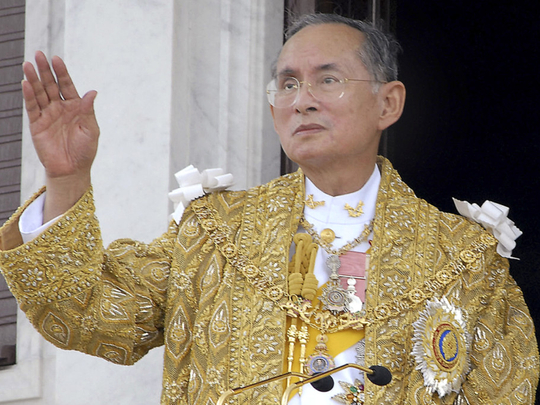
As tens of thousands of people descended on the Grand Palace in Bangkok to pay their last respects to King Bhumibol Adulyadej, global media examined the legacy of the late Thai monarch.
“He was a curious amalgam of modern and feudal: an American-born, Swiss-educated king who could not be criticised under Thailand’s lese-majeste laws; an accomplished sailor, painter and saxophonist who once jammed with Benny Goodman ... a constitutional monarch with limited powers, a head of state whose reign was punctuated by a progression of bad governments and coups, yet was loved by his countrymen,” said the New York Times in an editorial paying tributes to the king.
“Perhaps it was because he was all these things that King Bhumibol Adulyadej became the personification of Thai nationhood in his 70-year reign. And that is also why his passing is so troubling to his country and its allies,” the paper said.
Analysing the circumstances that brought the king to power, it said: “As south-east Asia became a battleground of East and West, the United States saw in the king a critical bulwark against Communism. But it was King Bhumibol himself who consolidated his place as a Buddhist patriarch to his people by touring villages to encourage development, often with doctors who would treat people on the spot. That endowed him with political powers far beyond his constitutional role and helped him defuse political conflicts and violence.”
The Bangkok Post meanwhile captured the state of shock and grief of the country at the passing of its most beloved icon. “No words can describe the sense of loss, the grief and anguish, that Thais of all generations feel today as they mourn the death of beloved King Bhumibol Adulyadej ... We Love the King, is one that most people would proudly display on their cars, houses and even desks. Few people, however, realise that it takes much more than just displaying a message to prove their love and loyalty to the monarchy. It is through actions, through attempts to carry on King Bhumibol’s legacy, that Thais can truly realise their pledge of unwavering affection to the monarchy,” the paper said in an editorial.
Observing that the king’s “most important and relevant advice touched on the need for unity, consensus and cooperation within society,” the paper said: “These ideas may sound simple but they have proven to be no easy tasks. Intense political conflicts that rocked the country a few years back, and are still lurking behind the seemingly calm surface upheld by the military regime, attest to how most people still fail in this mission to keep the country in peace.”
In Japan, the Asahi Shimbun put into context what the end of the King Bhumibol era night mean for Asia. “Thailand today is probably in a transition period as it grapples with a new approach to democratic politics. The direction Thailand takes in the years ahead will carry enough weight to affect the trend of politics, especially in Asia, and at a time when the democratic processes in many nations are regarded with suspicion. The demise of the great arbiter has left leaders and eligible voters of Thailand with difficult challenges, which could never be resolved by repeated street clashes and crackdowns on political opponents,” the paper said.
The Guardian meanwhile drew the world’s attention to the scope for renewal in Thailand and said: “After seven decades, he seemed the one constant in a nation that transformed itself economically and continued to struggle politically through multiple coups and outbursts of popular discontent. The king returned the monarchy to the centre of Thai politics, society and culture. Bhumibol’s image was that of an incorruptible people’s ruler, tirelessly engaged in development projects. His departure leaves the stage to large personalities, powerful interests and palace intrigue. It is possible that the coming years will see further political turbulence and potential hardship. But the country has an opportunity to look at itself afresh. It should use it wisely.”




_resources1_16a31069e4e_small.jpg)







